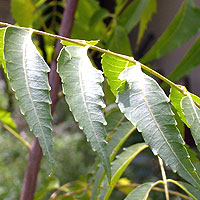Penn Herb Wellness Guide
NeemFind Products
 © Sebastian Pole
© Sebastian PoleHow It Works
The major active constituents in neem are terpenoids such as azadirachtin, which are considered to be antimicrobial and insect repellant among many other actions, and fatty acids and possibly other compounds in neem oil.8, 9
How to Use It
Traditionally, neem has been administered as roughly 10 to 20 ml (2 to 4 teaspoons) of leaf juice or 2 to 4 grams (1/7 to 1/10 of an ounce) of powdered leaf two or three times per day.10 Leaf extract gel or toothpaste, 1 gram (1/5 of a teaspoon) in the morning and at bedtime brushed all over the mouth, has been used effectively for dental plaque.11 Freeze-dried neem bark extract (30 to 60 mg twice a day) has been shown helpful for people with stomach ulcers.12 Creams containing 5% or more of neem oil or neem extracts are typically applied at least twice per day for skin or vaginal infections. Neem oil (in a concentration of 1 to 4%) mixed in coconut, mustard, or other oil bases is used for repelling insects.13
Copyright 2025 TraceGains, Inc. All rights reserved.
Learn more about TraceGains, the company.
The information presented by TraceGains is for informational purposes only. It is based on scientific studies (human, animal, or in vitro), clinical experience, or traditional usage as cited in each article. The results reported may not necessarily occur in all individuals. Self-treatment is not recommended for life-threatening conditions that require medical treatment under a doctor's care. For many of the conditions discussed, treatment with prescription or over the counter medication is also available. Consult your doctor, practitioner, and/or pharmacist for any health problem and before using any supplements or before making any changes in prescribed medications. Information expires December 2025.


